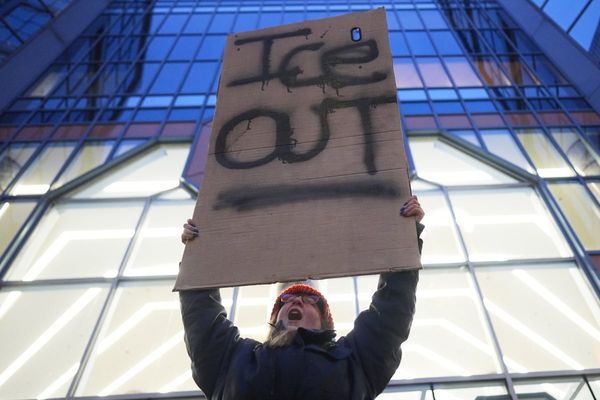
The Anti-Defamation League, one of the most prominent Jewish advocacy and anti-hate organizations in the US, has been the center of a rightwing pressure campaign that intensified on Wednesday when the FBI director, Kash Patel, denounced the group and said the agency would cut ties with the non-profit.
Patel’s announcement followed days of attacks by rightwing influencers and Elon Musk on the ADL over its online database on extremism, which included a page on slain far-right pundit Charlie Kirk’s Turning Point USA and the organization’s links to far-right extremists. On Tuesday, the ADL deleted its entire Glossary of Extremism, a flagship project which contained more than 1,000 entries on groups and movements with connections to hateful ideologies. The move failed to quell the backlash.
The fury against the ADL this week has placed the 112-year-old organization in a difficult position. It has faced years of internal turmoil as well as accusations it has attempted to appease the Trump administration and Musk at the expense of its core values. Now it finds itself targeted by some of the same conservative powers it once praised.
How did the ADL backlash begin?
Over the weekend, several influential rightwing accounts began posting screenshots of the ADL’s page on Turning Point USA (TPUSA), attacking the organization for including Kirk’s group in its Glossary of Extremism. One of the first posts, from a self-described “Twitter troll”, accused the ADL of having “blood on their hands”.
The ADL did not actually list TPUSA as an extremist organization, but instead documented incidents where its leadership and affiliated activists had either aligned with extremists or made “racist or bigoted comments”. Other rightwing activists soon followed the troll with more posts about the ADL. Some spread a screenshot of the ADL’s page on the Christian Identity movement – an extremist ideology that espouses a racial holy war against Jews and other minorities – to allege that the ADL was biased against Christians as a whole.
The online campaign against the ADL gained more momentum and exposure on Sunday night after Musk, who owns X and boasts over 220 million followers on the platform, began responding to posts about the non-profit and joining in on the attacks.
“The ADL hates Christians, therefore it is is [sic] a hate group,” Musk responded on Sunday night to an X account that usually tweets anti-immigrant content. In another post, Musk suggested that the ADL’s operations encouraged murder.
After days of rightwing outrage – that included Anna Paulina Luna, a Republican congresswoman – accusing the ADL of “creating a targeted hate campaign against Christians”, the organization announced on Tuesday that it had eliminated its entire glossary of extremism from its website – a database it touted in 2022 as “the most comprehensive and intuitive resource on extremist speech currently available to the public”. The ADL framed the decision to delete as a way to “explore new strategies and creative approaches to deliver our data and present our research more effectively”.
The ADL has weathered similar pressure campaigns from rightwing activists in the past, including from Chaya Raichik of the influential Libs of TikTok account in 2023, though these campaigns did not result in drastic deletion.
Failure to halt the backlash
Despite the ADL’s apparent capitulation to Musk and others, the rightwing campaign against the group continued. Less than 24-hours later, Kash Patel, the FBI director, posted on X that his agency would end its partnership with the ADL, accused the organization of spying on conservative groups, and denounced former FBI director James Comey’s praise of the group. The ADL had long partnered with law enforcement to hold workshops on antisemitism, conduct Holocaust education and provide information on extremist groups.
“James Comey wrote ‘love letters’ to the ADL and embedded FBI agents with them – a group that ran disgraceful ops spying on Americans,” Patel posted on X. “That era is OVER. This FBI won’t partner with political fronts masquerading as watchdogs”.
The ADL hasn’t received any formal communications from the Trump administration about its relationship with the FBI and is working to learn more, the organization said in a press release on Thursday.
“ADL has deep respect for the Federal Bureau of Investigation and law enforcement officers at all levels across the country who work tirelessly every single day to protect all Americans regardless of their ancestry, religion, ethnicity, faith, political affiliation or any other point of difference,” the press release reads.
The campaign against the ADL has taken place against the backdrop of a conservative movement that has sought to punish people and organizations that have been critical of Kirk. Conservative activists have claimed to have targeted tens of thousands of people who have allegedly criticized Kirk or celebrated the activist’s death, with one group proclaiming: “We will reshape the rank-and-file of America’s institutions.”
After the ADL removed its glossary of extremism, Musk and other right wing influencers began shifting their focus to the Southern Poverty Law Center – another prominent civil rights and anti-extremism organization. Musk called for the SPLC, which also documented Kirk’s group’s links to far-right extremism, an “evil organization” that “needs to be shut down”.
Didn’t the ADL defend Elon Musk?
Musk’s assault on the ADL this week is part of a longstanding, fraught relationship between the tech billionaire and the non-profit. The ADL has at times criticized Musk and his companies for incidents such as his Grok chatbot promoting pro-Nazi ideology and calling itself “MechaHitler”; however, it also defended Musk when he faced allegations of antisemitism.
Jonathan Greenblatt, ADL’s CEO, praised Musk in 2023 for saying he would block use of the pro-Palestinian slogan “from the river to the sea” on X. Only days before, though, Musk had endorsed an antisemitic conspiracy theory on X that claimed Jewish communities pushed hatred against white people. Greenblatt’s praise caused an uproar within the organization, and one of its top executives resigned after the incident.
The ADL went to bat for Musk once again earlier this year, after Jewish lawmakers and civil society groups condemned what they described as Musk’s fascist-style salutes on stage during a speech after Trump’s re-election. The ADL posted: “It seems that Elon Musk made an awkward gesture in a moment of enthusiasm, not a Nazi salute.”
Carrying water for Musk yet again led to further turmoil within the organization, with New York Magazine reporting that confused staffers had flooded the group’s Slack channels with messages and longtime liberal donors had rescinded promised gifts.
Musk has not publicly returned the praise. His clash this week is the most extreme episode in a longstanding feud that has included him amplifying calls to disband the organization and threatening to sue it over its work documenting the rise of antisemitism on X – something he claimed led to lost advertising revenue for the platform.
A turning point for the ADL
While the ADL has been cast into the spotlight on X this week, it has been a tumultuous few years in general for the organization. In addition to internal criticism over its defense of Musk, staffers and other extremism researchers have accused the group of prioritizing pro-Israel policies above a broader commitment to protecting civil rights and fighting antisemitism.
At least 17 staffers, donors and other affiliates of the organization have quit or otherwise parted ways in recent years as the organization’s priorities have shifted, according to New York Magazine. Yet the ADL remains one of the most well-resourced and influential civil society groups in the US, with around $163m in revenue last year alone.
Much of the controversy has focused on Greenblatt, who has publicly backed the Trump administration’s clampdown on pro-Palestinian speech and campus protests. Greenblatt praised Trump last year for withholding $400m in grants to Columbia University after campus protests and the ADL complimented Immigration and Customs Enforcement’s illegal arrest of pro-Palestinian activist Mahmoud Khalil.
“We appreciate the Trump Administration’s broad, bold set of efforts to counter campus antisemitism – and this action further illustrates that resolve by holding alleged perpetrators responsible for their actions,” the ADL posted above a tweet about Khalil’s arrest.
The incident reflected a concern from some staffers and other Jewish organizations that the ADL has undermined its legitimacy as it sought to collaborate with the administration, with former ADL extremism researcher Vegas Tenold writing at the time: “By carrying the administration’s water, the ADL lends its voice and credibility to Trump’s efforts to dehumanize and criminalize dissent.”
The best public interest journalism relies on first-hand accounts from people in the know.
If you have something to share on this subject, you can contact us confidentially using the following methods.
Secure Messaging in the Guardian app
The Guardian app has a tool to send tips about stories. Messages are end to end encrypted and concealed within the routine activity that every Guardian mobile app performs. This prevents an observer from knowing that you are communicating with us at all, let alone what is being said.
If you don't already have the Guardian app, download it (iOS/Android) and go to the menu. Select ‘Secure Messaging’.
SecureDrop, instant messengers, email, telephone and post
If you can safely use the Tor network without being observed or monitored, you can send messages and documents to the Guardian via our SecureDrop platform.
Finally, our guide at theguardian.com/tips lists several ways to contact us securely, and discusses the pros and cons of each.







